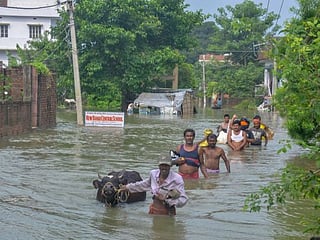Pakistan-Emirati Military Hospital treats 10,000 COVID-19 patients in Rawalpindi
The US$108 million Pakistan-Emirati Military Hospital was built in Rawalpindi

Islamabad: The UAE continues its firm commitment to international cooperation by providing essential health and humanitarian supplies to nations grappling with the impact of the coronavirus, COVID-19.
The Pakistan-Emirati Military Hospital in the Pakistani city of Rawalpindi stands as a shining example of the UAE’s humanitarian and developmental initiatives to combat pandemics and natural calamities.
In the past few months, the hospital received and provided medical treatment to more than 10,000 patients infected with the coronavirus
Key project
The US$108 million Pakistan-Emirati Military Hospital was built in line with the directives of President His Highness Sheikh Khalifa bin Zayed Al Nahyan; His Highness Sheikh Mohamed bin Zayed Al Nahyan, Crown Prince of Abu Dhabi and Deputy Supreme Commander of the UAE Armed Forces, and Sheikh Mansour bin Zayed Al Nahyan, Deputy Prime Minister and Minister of Presidential Affairs.
According to Abdullah Khalifa Al Ghafli, Director of the UAE’s Pakistan Assistance Programme, UAEPAP, the hospital is considered one of the key projects carried out in Pakistan recently.
“The UAE leadership has shown keen interest in supporting several humanitarian initiatives in Pakistan in many developmental and humanitarian areas,” he added.
He also attributed the hospital’s success in assisting the Pakistani government and army in combating COVID-19 to the wise approach of the UAE leadership in solidarity with the people of Pakistan.
Modern facilities
Major General Professor Salman Saleem, Director of the Pakistani-Emirati Military Hospital, said the hospital, which was built in 2013, is among the biggest and most important military health projects in Pakistan. The integrated medical facility also offers internship and residency training programmes.
Prof. Saleem said that due to the coronavirus outbreak, the hospital was transferred to a centre for managing and treating the infected people from different parts of Pakistan.
“In late February, we developed a strategy to deal with the pandemic and started taking all necessary precautions, including isolating and treating the patients in a specially-created unit,” he added.
He expressed appreciation to the UAE leadership for the humanitarian and developmental projects in Pakistan and building and equipping the military hospital in Rawalpindi.
Brigadier Dr. Shazia Nisar, Head of the Pathology and Epidemiology Department, said the hospital’s state-of-the-art facilities and equipment helped in providing medical treatment to thousands of patients infected with the coronavirus.
In the last three months, the UAE sent three shipments of medical aid to Pakistan, totally weighing 18.3 tonnes, in addition to 20,000 coronavirus testing devices to help over 18,300 medical workers.
1,400 bed hospital
The 1,400-bed hospital can cater to between 6,000 and 9,000 patients daily or three million a year. It has dedicated wards for outpatient clinics, specialist clinics, emergency unit, pharmacies, laboratories, radiology section and the blood bank.
It is operated by 350 doctors, 800 nursing staff and 1,500 technical and administrative staff. The hospital was co-funded by the Abu Dhabi Fund for Development and the Khalifa Bin Zayed Al Nahyan Foundation.
Sign up for the Daily Briefing
Get the latest news and updates straight to your inbox









